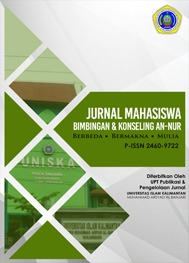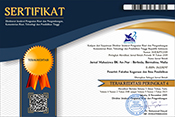PENGARUH KECERDASAN EMOSIONAL DAN GENDER SEBAGAI MODERASI TERHADAP EFIKASI DIRI DALAM PENGAMBILAN KEPUTUSAN KARIER DI SMA NEGERI
(1) Magister Bimbingan Konseling Fakultas Ilmu Pendidikan, Universitas Negeri Jakarta
(2) Magister Bimbingan Konseling Fakultas Ilmu Pendidikan, Universitas Negeri Jakarta
(3) Magister Bimbingan Konseling Fakultas Ilmu Pendidikan, Universitas Negeri Jakarta
(*) Corresponding Author
Sari
Kata Kunci
Teks Lengkap:
PDFReferensi
Alwisol. (2009). Psikologi Kepribadian. UMM Press.
Ardiyanti, D. (2014). Pelatihan PLANS untuk Meningkatkan Efikasi Diri Dalam Pengambilan Keputusan Karir Pada Siswa SMA. Universitas Gadjah Mada.
Arikunto, S. (2010). Prosedur Penelitian: Suatu Pendekatan Praktik. In Cardiology. Rineka Cipta Badesch.
Arlinkasari, F., Rahmatika, R., & Akmal, S. Z. (2016). The Development of Career Decision Making Self-Efficacy Scale ( Indonesia Version ). International Symposium on Business and Social Science, Jeju Island, South Korea, April 2016, 148–158.
Bandura, A. (1994). Self-Efficacy: Encyclopedia of human behavior. 4,(pp. 71-81). Editors VS Ramachaudran. NY: Academic Press.
Bandura, A., Freeman, W. H., & Lightsey, R. (1999). Self-Efficacy: The Exercise of Control. In Journal of Cognitive Psychotherapy (Vol. 13, Issue 2, pp. 158–166). Springer. https://doi.org/10.1891/0889-8391.13.2.158
Bariyyah, K., & Latifah, L. (2019). Kecerdasan emosi siswa ditinjau dari jenis kelamin dan jenjang kelas. JPGI (Jurnal Penelitian Guru Indonesia), 4(2), 68–75.
Betz, N. E., & Hackett, G. (1983). The relationship of mathematics self-efficacy expectations to the selection of science-based college majors. Journal of Vocational Behavior, 23(3), 329–345.
Betz, N. E., Klein, K. L., & Taylor, K. M. (1996). Evaluation of a short form of the career decision-making self-efficacy scale. Journal of Career Assessment, 4(1), 47–57.
Betz, N. E., & Luzzo, D. A. (1996). Career assessment and the career decision-making self-efficacy scale. Journal of Career Assessment, 4(4), 413–428.
Bozgeyikli, H., Bacanli, F. & Dogan, H. (2009). Examination of 8th grade elementary school students’ career decision making self-efficacy predictors. Selçuk Üniversitesi Sosyal Bilimler EnstitüsüDerg.
Brown, C., George-Curran, R., & Smith, M. L. (2003). The role of emotional intelligence in the career commitment and decision-making process. Journal of Career Assessment, 11(4), 379–392.
Bullock‐Yowell, E., Andrews, L., McConnell, A., & Campbell, M. (2012). Unemployed Adults’ Career Thoughts, Career Self‐Efficacy, and Interest: Any Similarity to College Students? Journal of Employment Counseling, 49(1), 18–30.
Caruso, D. R. (2004). Comment on RJ Emmerling and D. Goleman, Emotional intelligence: Issues and common misunderstandings. Retrieved May, 17, 2004.
Creed, P., Patton, W., & Prideaux, L.-A. (2006). Causal relationship between career indecision and career decision-making self-efficacy: A longitudinal cross-lagged analysis. Journal of Career Development, 33(1), 47–65.
Di Fabio, A., & Kenny, M. E. (2012). The contribution of emotional intelligence to decisional styles among Italian high school students. Journal of Career Assessment, 20(4), 404–414.
Di Fabio, A., & Saklofske, D. H. (2014). Comparing ability and self-report trait emotional intelligence, fluid intelligence, and personality traits in career decision. Personality and Individual Differences, 64, 174–178.
Emmerling, R. J., & Cherniss, C. (2003). Emotional intelligence and the career choice process. Journal of Career Assessment, 11(2), 153–167.
Feist, Jess, dan G. J. (2013). No TitleTheories of Personality. Ed.8. McGraw-Hill.
Flores, L. Y., & Obasi, E. M. (2005). Mentors’ influence on Mexican American students’ career and educational development. Journal of Multicultural Counseling and Development, 33(3), 146–164.
Gianakos, I. (2001). Predictors of career decision-making self-efficacy. Journal of Career Assessment, 9(2), 101–114.
Jiang, Z. (2014). Emotional intelligence and career decision‐making self‐efficacy: national and gender differences. Journal of Employment Counseling, 51(3), 112–124.
Kafetsios, K., & Zampetakis, L. A. (2008). Emotional intelligence and job satisfaction: Testing the mediatory role of positive and negative affect at work. Personality and Individual Differences, 44(3), 712–722.
Kim, J. H., & Yoo, H. (2012). The Role of Gender and Personality Traits in the Career Decision-Making Self-Efficacy of Korean College Students. Journal of Asia Pacific Counseling, 2(1), 109–120.
Law, K. S., Wong, C.-S., & Song, L. J. (2004). The construct and criterion validity of emotional intelligence and its potential utility for management studies. Journal of Applied Psychology, 89(3), 483.
Lent, R. W., & Brown, S. D. (2013). Social cognitive model of career self-management: toward a unifying view of adaptive career behavior across the life span. Journal of Counseling Psychology, 60(4), 557.
Lent, R. W., Brown, S. D., & Hackett, G. (1994). Toward a unifying social cognitive theory of career and academic interest, choice, and performance. Journal of Vocational Behavior, 45(1), 79–122.
Lyon, D. W., & Kirby, E. G. (2000). The career planning essay. Journal of Management Education, 24(2), 276–287.
Mayer, J. D., & Salovey, P. (1997). What is emotional intelligence. Emotional Development and Emotional Intelligence: Educational Implications, 3, 31.
Mayer, J. D., Salovey, P., Caruso, D. R., & Sitarenios, G. (2001). Emotional intelligence as a standard intelligence.
Ogutu, J. P., Odera, P., & Maragia, S. N. (2017). Self-Efficacy as a Predictor of Career Decision Making Among Secondary School Students in Busia County, Kenya. Journal of Education and Practice , 8(11), 20–29. www.iiste.org
Ormrod, J. E. (2008). Psikologi Pendidikan: Membantu Siswa Tumbuh dan Berkembang Jilid 2. 435.
Pertiwi, D. R. S. (2020). Peran Efikasi Diri Sebagai Mediator Hubungan Perilaku Orang Tua dan Kesulitan Pengambilan Keputusan Karier Anak. Universitas Islam Indonesia.
Priyatno, D. (2010). jam belajar olah data dengan SPSS 17. Andi.
Putri, D. T. (2021). Hubungan Aliansi Konseling dan Kualitas Layanan Kepuasan Konseli Terhadap Layanan Konseling Kelompok Secara Daring. Universitas Negeri Jakarta.
Ramadhani, R. (2019). Uji Validitas Konstruk terhadap Adaptasi dari Wong and Law Emotional Intelligence Scale (WLEIS). JP3I (Jurnal Pengukuran Psikologi Dan Pendidikan Indonesia), 5(2).
Salovey, P., & Birnbaum, D. (1989). Influence of mood on health-relevant cognitions. Journal of Personality and Social Psychology, 57(3), 539.
Santos, A., Wang, W., & Lewis, J. (2018). Emotional intelligence and career decision-making difficulties: The mediating role of career decision self-efficacy. Journal of Vocational Behavior, 107, 295–309.
Scott, A. B., & Ciani, K. D. (2008). Effects of an undergraduate career class on men’s and women’s career decision-making self-efficacy and vocational identity. Journal of Career Development, 34(3), 263–285.
Sedarmayanti, H. (2011). Syarifudin.”. In Metodologi Penelitian. Penerbit Mandar Maju.
Seijts, G. H., Latham, G. P., Tasa, K., & Latham, B. W. (2004). Goal setting and goal orientation: An integration of two different yet related literatures. Academy of Management Journal, 47(2), 227–239.
Sharf, R. S. (2013). Advances in theories of career development.
Sholiha, R. A., & Sawitri, D. R. (2021). HUBUNGAN ANTARA KECERDASAN EMOSIONAL DAN EFIKASI DIRI DALAM MENGAMBIL KEPUTUSAN KARIR PADA MAHASISWA TAHUN KEEMPAT ANGKATAN 2017 FAKULTAS PSIKOLOGI UNIVERSITAS DIPONEGORO. Jurnal EMPATI, 10(4), 294–299.
Solimun, Fernandes, A. A. R., & Nurjanah. (2017). Metode Statistika Multivariat : Pemodelan Persamaan Struktural ( SEM ) Warp PLS. Universitas Brawijaya Press.
Sugiyono, D. (2013). Metode penelitian pendidikan pendekatan kuantitatif, kualitatif dan R&D.
Surjono, P., & Sutikno, F. R. (2015). Gender equality and social capital as rural development indicators in Indonesia (Case: Malang Regency, Indonesia). Procedia-Social and Behavioral Sciences, 211, 370–374.
Tabernero, C., & Wood, R. E. (2009). Interaction between self-efficacy and initial performance in predicting the complexity of task chosen. Psychological Reports, 105(3_suppl), 1167–1180.
Taylor, K. M., & Betz, N. E. (1983). Applications of self-efficacy theory to the understanding and treatment of career indecision. Journal of Vocational Behavior, 22(1), 63–81.
Tomevi, C. (2013). Career-decision self-efficacy among college students with symptoms of Attention Deficit Disorder. McNair Scholars Research Journal, 9(1), 13.
Widianingrum, D., & Hastjarjo, T. D. (2016). Pengaruh bimbingan karier terhadap efikasi diri dalam pengambilan keputusan karier pada siswa. Gadjah Mada Journal of Psychology (GamaJoP), 2(2), 86–100.
Winkel, W. S. (2021). Bimbingan dan konseling di institusi pendidikan.
Woolfolk. A. (2009). Educational Psychology: Active Learning Edition. Pustaka Pelajar
DOI: http://dx.doi.org/10.31602/jmbkan.v8i3.7866
Refbacks
- Saat ini tidak ada refbacks.
Akun Akademik Anda Terhubung dengan :
Didedikasikan Untuk:
Jurnal Mahasiswa BK An-Nur : Berbeda, Bermakna, Mulia disseminated below Lisensi Creative Commons Atribusi 4.0 Internasional.
















